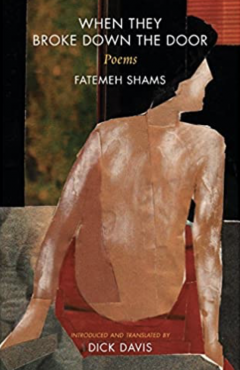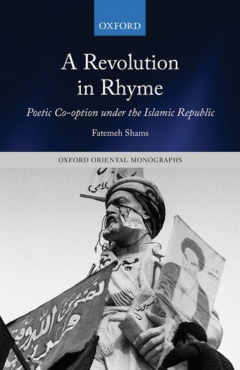Fatemeh Shams is a poet, intersectional feminist activist, and associate professor of Persian literature. She also serves as core faculty member of Gender, Sexuality, and Women’s Studies Program at Penn. Her scholarship lies at the intersections of sociology, gender studies, and literature with a focus on literary production as a politicizing practice. Her critical monograph, A Revolution in Rhyme: Poetic Co-Option Under the Islamic Republic (Oxford University Press, 2021) is a groundbreaking account of literary canon formation under the autocratic rule of the Islamic Republic in comparison with the Soviet experience. Her essays address questions of gendered literary historiography, womanhood, threshold, and sensory representations of exilic identity in the Persianate world and beyond through a comparative lens.
Shams is also an internationally acclaimed, award-winning poet. Her poetry engages the fundamental struggles of her era: tyranny, sexual violence, bodily autonomy, alienation, forced displacement, and loss of the mother tongue. Writing in a wide range of forms from classic styles to prose poetry, Shams constantly moves beyond rigid boundaries of form and language to write about haunting memories of childhood and coming of age in her hometown and the experience of living in exile and her struggle for gender justice. Her literary honors and awards include the Jaleh Esfahani Poetry Award in 2013, the Latifeh Yarshater Prize in 2016, the Poetry International Chapbook Prize in 2023 among others. In her bilingual collection, When They Broke Down the Door translated from Persian by Dick Davis, Shams delves into the highly personal along with the struggles of post-revolution Iran. Her poems and literary essays have been featured in the Poetry Magazine, Michigan Quarterly Review, London Poetry Magazine, World Literature Today, Penguin Book of Feminist Verse, Penguin Anthology of Persian Women Poets, and elsewhere.
More recently, Shams was awarded a Humboldt Foundation fellowship and spent 18 months at the Forum Transregionale Studien in Berlin and Marburg University where she conducted archival work on her new monograph which focuses on modern Iranian exile poetry.
As an intersectional feminist activist living in exile since 2009, Shams has tirelessly advocated for political change, structural justice, and gender equality with a specific focus on the Iranian and Afghan women’s right to bodily and intellectual freedom and autonomy. Her interviews and opinions have been featured in the New Yorker, CNN, BBC, the Washington Post, the New York Times, the Guardian, NPR, and elsewhere. She has been named as the 2024 Greeley Peace Scholar by the University of Massachusetts, Lowell. She serves as a board member of WLP, an international network consisting of 20 autonomous women’s rights organizations in the Global South that promotes women’s leadership and human rights.
- Introduction to Persian Poetic Tradition (NELC 1700)
- Modern Iran and the West through the Lens of Fiction (NELC 1710)
- Faces of Love: Gender, Sexuality and the Erotic in Persian Literature (NELC 2400)
- Media and Culture in Contemporary Iran (NELC 2750)
- Modern Middle Eastern Literatures in Translation (NELC 0610)
- Persian Culture, Literature and Film for Advanced Learners I & II (PERS 2000 & 2100)
- Forthcoming: Hopsctoch (Poetry Chapbook), Ugly Duckling Presse & Falschrum Books, Spring 2024.
- Forthcoming: “Speaking on the Threshold of Being: Liminality and Heterotopia in Sohrab Sepehri’s Poetry,” Irannamag, Winter 2024.
- “Notes on Another Exodus: The Four-Month Struggle to Evacuate Afghan Poets and Scholars,” Michigan Quarterly Review, 2022.
- “Sensorium of Exile: The Case of Elyas Alavi and Gloria Anzaldùa,” Losing Our Minds, Coming to Our Senses (Leiden: Leiden University Press, 2021).
- A Revolution in Rhyme: Poetic Co-Option Under the Islamic Republic (Oxford: Oxford University Press, 2021).
- "Under the Waves: The Many Lives of Moniru Ravanipour’s The Drowned,” Iranian Studies, Vol. 55 , Issue 1, pp. 237-249.
- “Dialogues with the Dead: Necropoetics of Zahra’s Paradise,” Iranian Studies, vol. 53. issue 5-6 (2019): 893-909.
- “From Revolution to Silence: A Political Biography of Qaysar Aminpur,” in The Layered Heart: Essays on Persian Poetry, ed. A.A. Seyed Ghorab, Washington DC: Mage Publishers, 2018): 551-88.
- “Village in Contemporary Persian Poetry,” Iranian Studies, vol. 51, issue 3 (2018): 455-477.
- “Islamic Republican War Poetry and Ideology of Warfare,” International Journal of Persian Literature, vol.1 (2017): 5-25.
- “Literature, Art and Ideology Under the Islamic Republic,” New Leaves, Fresh Looks: Essays on Persian, Language, Literature, and Culture, ed. Kamran Talattof, (Abingdon: Routledge, 2015): 163-192.



